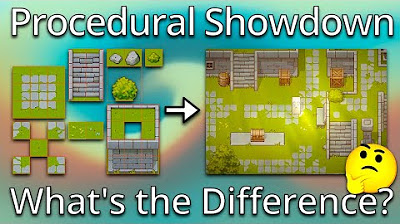Generative grammars as a form of procedural content generation
Summary
TLDR本视频讨论了生成语法在游戏开发中的应用,特别是在程序生成内容方面。生成语法是一种基于规则的文本生成技术,可以通过替换特定词汇来创造多样化的内容。视频中通过一个简单的地下城生成示例,展示了如何使用生成语法来设计游戏关卡,包括房间布局、任务和故事情节。此外,还提到了生成语法在命名、世界构建等方面的潜力。尽管生成语法在处理空间和非线性布局方面存在局限性,但它为创造个性化游戏体验提供了强大的工具。
Takeaways
- 📚 生成语法在游戏开发中有广泛应用,如语言解析器、文本预测等。
- 🎲 生成语法可以定义为一系列规则,用于如何以及何时替换某些词语。
- 🗺️ 通过生成语法,可以创建随机或定制化的程序生成内容。
- 🏰 例如,可以生成类似塞尔达游戏中的线性地牢体验。
- 🔄 通过迭代替换,可以生成具有不同房间和事件的复杂地牢布局。
- 📈 生成语法允许设置最小和最大地牢大小等具体规则,以创造更精致的体验。
- 📝 生成语法可以用于描述玩家动作、任务、故事节拍和命名人、地点等。
- 📚 有研究者使用生成语法来分析MMORPG任务模式,并生成具有不同复杂性和吸引力的任务。
- 🔄 生成任务时,可以结合动机、策略和行动序列来增加任务的深度和多样性。
- 🌐 生成语法的一个限制是它是一维的,没有空间或非线性概念。
- 🔍 尽管生成语法有局限性,但它的规则基础替换概念对于内容生成仍然非常有价值。
Q & A
什么是生成语法?
-生成语法是一种广泛的研究领域,与语言解析器、文本预测等相关。在游戏开发中,可以将其定义为一系列单词或句子,以及关于何时以及如何替换某些单词的规则。
生成语法在游戏开发中有哪些应用?
-生成语法在游戏开发中可以用于创建程序生成的内容,如随机或手工定制的地下城布局、任务生成、玩家行为描述、故事情节生成以及命名人、地点和事物等。
如何使用生成语法来创建一个地下城体验?
-可以通过一个基本模板句子开始,然后根据规则替换其中的“房间”单词,例如将其替换为谜题、战斗遭遇或宝藏房间等,直到所有“房间”都被替换。
生成语法如何实现更具体的游戏内容定制?
-可以通过定义更具体的替换规则,例如最小和最大地下城大小,以及更具体和规则驱动的替换,来创建更具手工艺品感的体验。
生成语法在任务生成中的应用是什么?
-生成语法可以用于创建基于结构分析的任务生成器,通过分析MMORPG中的任务模式,使用生成语法来生成不同复杂度和吸引力的任务。
生成语法在游戏开发中的主要局限性是什么?
-生成语法的主要局限性在于它是一维的,没有空间或非线性的概念,这使得在创建复杂的空间布局时会变得混乱。
如何克服生成语法在空间布局上的局限性?
-可以通过使用生成语法的多维表亲——图重写技术来设置空间和非线性布局,这是一种更好且更常用的方法。
生成语法的人类可读性有什么优势?
-生成语法的人类可读性意味着非程序员,如关卡设计师或玩家,可以手动编写内容,然后由系统解析,这使得内容创建更加灵活和易于操作。
在生成语法中,如何确保生成的内容不会导致不可能的空间?
-需要编写规则来确保生成的空间是合理的,并且在出现问题时进行调试,这可能需要在生成过程中进行多次迭代和调整。
生成语法系统在编码时应该考虑哪些因素?
-在编码时,应该考虑如何表示单词或对象的列表,如何迭代列表以满足生成条件,以及如何实现递归替换函数以优化迭代过程。
生成语法在游戏设计中如何与其他生成方法结合使用?
-生成语法提供了基于规则的替换概念,这使得它可以与任何生成方法结合使用,同时仍然能够为玩家提供深思熟虑的体验。
Outlines

此内容仅限付费用户访问。 请升级后访问。
立即升级Mindmap

此内容仅限付费用户访问。 请升级后访问。
立即升级Keywords

此内容仅限付费用户访问。 请升级后访问。
立即升级Highlights

此内容仅限付费用户访问。 请升级后访问。
立即升级Transcripts

此内容仅限付费用户访问。 请升级后访问。
立即升级浏览更多相关视频

A Course About Game Balance

Procedural Generation in Unity

How to use Cursor AI for iOS App Development (5 Techniques)

Procedural Generation with Wave Function Collapse and Model Synthesis | Unity Devlog

Launching CXL Memory in Hyperscale Deployments with a Holistic CXL Ecosystem

Tout ce que vous devez savoir sur les projets agiles (SCRUM)
5.0 / 5 (0 votes)